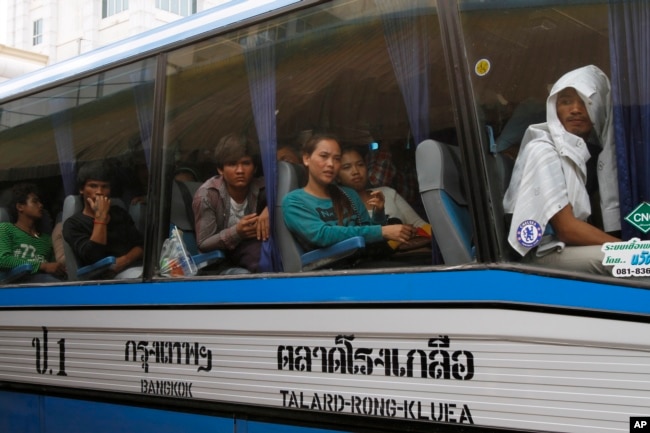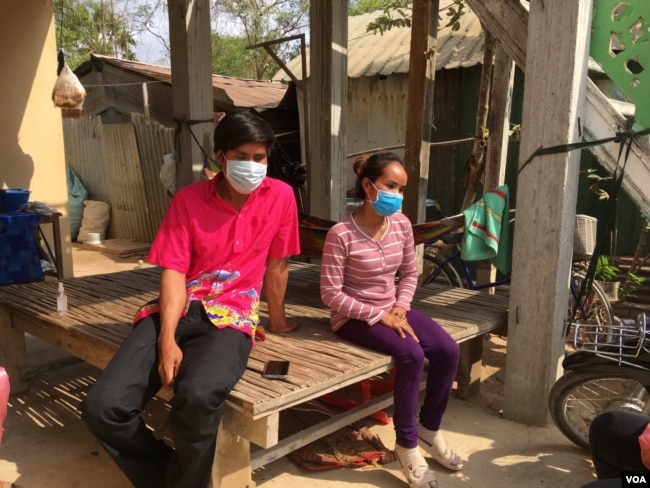As Loan Payments Approach, Indebted Migrant Workers Face Economic Uncertainty
TAKEO PROVINCE, CAMBODIA —
Min Sarun and Neang Chantrea reached the Ban Laem border checkpoint in Chanthaburi, Thailand, on the morning of April 2. Around a hundred Cambodian migrant workers were waiting to cross into the country. They were informed that the Cambodia-Thai border had been closed to prevent the spread of the novel coronavirus.
Unable to cross the border and desperate to return to Takeo province, the couple were told that for a fee of 1,500 baht each, a total of approximately $92, they could cross the border. Min Sarun and Neang Chantrea quickly agreed, made the payment and were escorted through three kilometers of wooded area till they reached a clearing. It was a small, military-controlled checkpoint.
“At the informal checkpoint, there were no government officials, only military officials,” said 40-year-old Min Sarun. “Our nephew came to pick us up from there.”
Min Sarun and Neang Chantrea, who worked at a chicken factory, were part of the nearly 70,000 Cambodian migrant workers who rushed back in the last weeks of March to avoid being stuck in Thailand on account of the novel coronavirus, which by then had been declared a global pandemic.
Last week, Interior Minister Sar Kheng said 68,000 migrant workers had returned from Thailand since the onset of the COVID-19 outbreak. A week prior, the interior minister said border officials were unable to monitor and provide health checkups for the thousands of workers rushing to cross the border before its closure on March 24.
Thailand is home to around 1.2 million Cambodian migrant workers, according to Cambodian government estimates, a significant number of whom are undocumented.
A 2019 International Organization for Migration report showed that a third of migrant workers surveyed were unemployed before leaving Cambodia, nearly half had zero income and around two-thirds moved to Thailand due to a lack of job opportunities in the Kingdom and to earn a better income.
More than half the respondents remitted up to $1,228 on average a year, adding that this money was the primary income for their families in Cambodia or was needed to improve their living conditions.
Sitting at their home in Takeo province’s Bati district, Min Sarun and Neang Chantrea were on the third day of their mandated 14-day isolation when VOA Khmer reporters met them.
While the couple has a sizeable home – consisting of two separate wooden and concrete structures sitting side-by-side on the small plot – they have sent their children and Min Sarun’s mother to live with relatives.
The bottom floor of the concrete structure has been turned into a makeshift bedroom, enclosed with loose sheets, for the couple to spend the rest of the isolation period.
Neang Chantrea said local health officials visited them three times on the first day, and left frequently thereafter. Officials checked if they had a fever or other COVID-19 symptoms, but always warned them to remain in isolation.
“I did not get to meet them,” she said, referring to neighbors she hadn’t seen for months. “The villagers also do not dare to talk to us.”
For Min Sarun, the risky, and relatively expensive journey, back to Cambodia was necessitated by his mother’s failing health.
“I had money to send home but my mother was sick and there was no one to take care of her,” he said, seated on a wooden bench outside the home. “So, I had to return to take care of her, no matter if it made me broke.”
Working at a chicken farm in Thailand since late 2017, the couple earned around 7,000 baht ($215) every fortnight, which would increase significantly if they put in overtime. Of the close to 14,000 baht the couple earned a month, around $430, at least 5000 baht ($153), if not more, was sent to run the household in Takeo.
Additionally, 2000 baht ($61) was sent back every month to an informal lender, who had given the couple $2,000 a few years ago to migrate to Thailand. This covered the cost of their passport and other “preparations” they needed for the migration.
Having returned to Takeo, and despite the relief of being in their hometown and with their family, the couple sees little hope in the coming months. After completing their isolation period, Min Sarun is worried about getting a job – the impetus for him to leave Cambodia in the first place.
With no income, the couple reached out to Min Sarun’s brother to pay their monthly installment to the informal lender for April, putting an additional strain, he said, on the sibling, who had his loans to repay.
“It was hard to return home because we don’t have any jobs, and now we are kept in isolation for 14 days, it is even harder,” Min Sarun said. “If it remains like this for a few months, I will not have any solution.”
Informal financial service providers have been a traditional source of unregulated, and pricey, debt for Cambodians, even with the more recent proliferation of profit-making microfinance institutions (MFIs).
While they are still prevalent as a primary source of debt, a 2015 International Finance Corporation report pointed to the possibility that these lenders were also being used to supplement MFI loan payments, hence leading to the low rates of delinquency seen in the microfinance sector.
Last year, local rights groups Licadho and Sahmakum Teang Tnaut released a report highlighting the rights abuses linked to the MFI sector, especially on land tenure security, forced migration and child labor. The report’s case studies also showed that respondents had used informal loans to pay back MFI monthly installments.
Back in Bati district, Seang Naroth and her husband, Seng Va, returned to Cambodia on March 24, just as the border crossing at Poipet, Banteay Meanchey, was being closed.
They found themselves stuck with hundreds, if not thousands of workers hoping to get home. After a few, rudimentary health checks from Thai and Cambodian officials, the couple crossed into Cambodia and took a minivan, which they rented for themselves, straight home.
On returning home, Seang Naroth said the local police, the village chief and health officials swarmed their home, cause a sense of panic in the neighborhood.
Having just finished their 14-day isolation period, Seng Naroth said the couple had not returned for fear of the viral pandemic. They, instead, were hoping to meet their young son and celebrate Khmer New Year with the family, before returning to Thailand later in April.
Having worked in a garment factory before their migration, where her earnings were around $200 a month, Seang Naroth wanted a better life for her son.
So, the Takeo residents borrowed around $1,200 from an informal lender to pay for all the documentation and travel needed to move to Thailand, a loan they preferred because it did not require the depositing of their land title as collateral.
Working in construction in Chonburi province, the couple earned around 30,000 baht a month, around $920 combined, of which they had to send back at least $100 a month to repay just the interest, Seang Naroth said.
After nearly two years of payments they still owed around $1,000, Seng Va said, and now a trip to meet their son and celebrate the annual holiday with the family had turned into a financial nightmare for the young couple.
“It is hard. We are here and it is hard to find a job. The villagers do not want to come close to us,” Seng Va said. “I am not sure if we have money to pay as now we are jobless.”
“I have only hugged my son once, and that too only after spraying myself with alcohol,” Seang Naroth said, upset that the 14-day isolation period had meant she was unable to meet her 3-year-old son.
Given their exposure to high levels of debt, Khun Tharo, program coordinator at labor rights group Central, said returning migrant workers were especially vulnerable during the economic slowdown instigated by the COVID-19 pandemic.
He said this was further exacerbated by the government’s inability to implement fiscal policies and social protections, like unemployment benefits, to alleviate the economic adversity facing these workers in the coming months.
“[C]ambodian migrant workers who are currently returning to their communities or are planning to cross the border are most vulnerable to themselves, their families and communities and likely have no access to adequate public support services or social support assistance,” Khun Tharo said.
Takeo governor Ouch Phea said the local administration was assisting workers returning from Thailand and were disseminating health and safety information from the Ministry of Health to ensure their wellbeing, though not detailing if any other social protections were available to the returnees.
“We are worried that is why we educate workers using posters and using radio and mobile loudspeakers to educate each locality, as [workers] keep coming from Thailand,” Ouch Phea said.
Back at Min Sarun’s home in Bati district, the couple is waiting to finish their isolation period and reunite with their children, adding that they were happy to be home despite the hassles of getting back.
But, Min Sarun cannot let go of the fact that soon he will need another $61 for the informal lender, putting additional strain on the family’s monthly finances.
“I will not be returning to Thailand because my mother is getting older and she is sick,” he said. “But it would also be nice to have a job and be close to our children.”
“What is important is whether we can find a job to afford our family expenses.”
Source: VOA





